Amidst today’s current wellness revolution, elderberry syrup has been captivating holistic health enthusiasts and skeptics alike. Many are in pursuit of more holistic and natural remedies to help strengthen our immune systems.
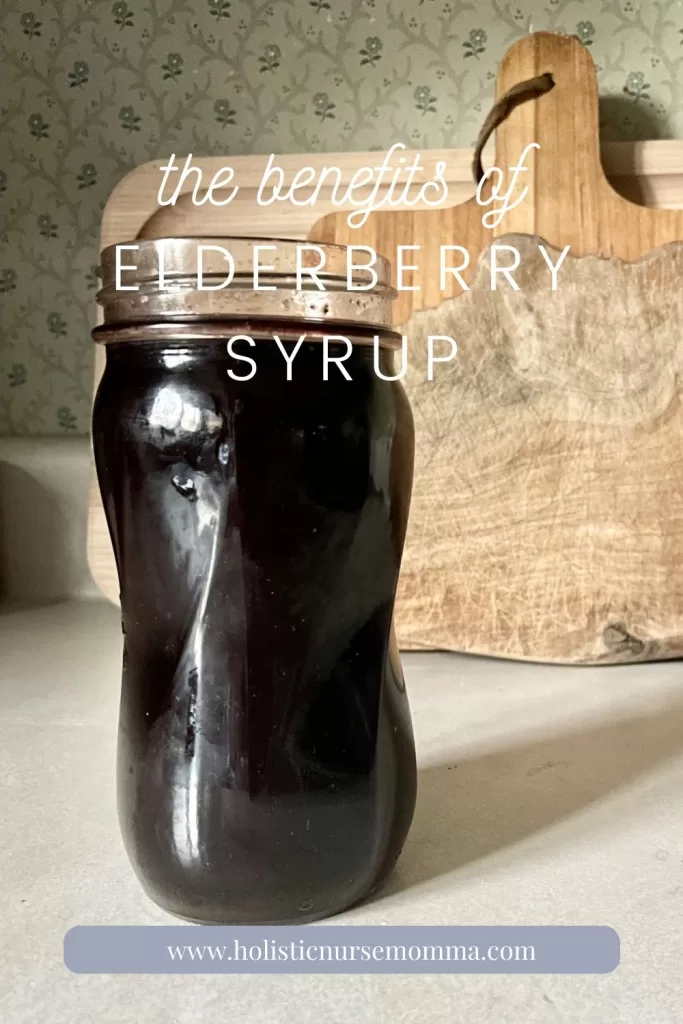
]If you’ve ever wondered about elderberry syrup, you’re in the right place. Today I’m going to explore elderberry’s benefits and uses behind this age-old remedy that has seamlessly woven itself into modern wellness and share the recipe I use to make elderberry syrup. In this post, we’ll dive into the natural world of elderberries and discover why this syrup is not just a trend, but a time tested ally. Let’s dive into the benefits of elderberry syrup!
Elderberry Syrup Benefits
Elderberry are the dark berries that come from the elder tree (Sambucus nigra). In the past few years, it has been gaining popularity for it’s numerous health benefits. If you live in certain parts of the United States, you may even begin to notice the unrip white berries as you drive along in about May to June. This is also a good sign because then you know you can grow these berries yourself and save some money if you plan to make elderberry syrup, jams, or teas for the winter!
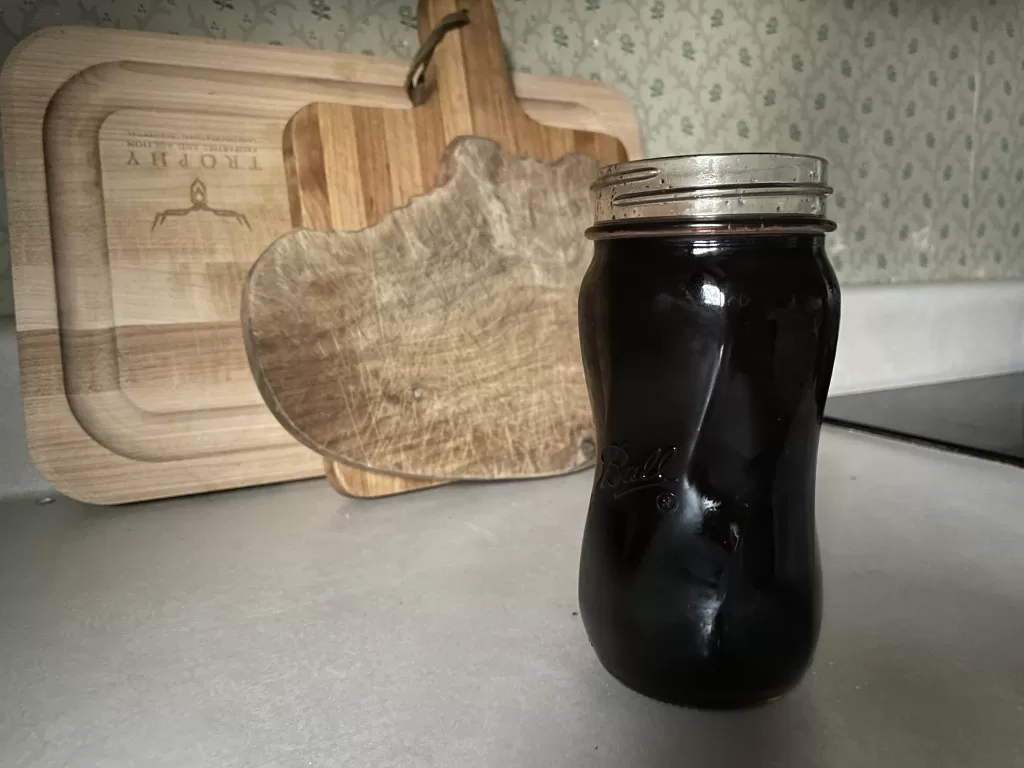
Immune Support
One of the most well known benefits of elderberries is their immune boosting properties. Since the berries are packed with antioxidants, they help to neutralize harmful free radicals in the body. One such antioxidant is anthocyanins. Anthocyanins are the “super heroes”, so to speak, in our fruits and vegetables. They give fruits their beautiful red, blue, or purple color. This also helps the immune system’s ability to defend against infections and illnesses.
Antiviral Properties
Elderberries have been shown to have antiviral effects, particularly against respiratory illness. Some studies suggest that elderberry extract can inhibit viruses, like influenza (the flu), from replicating and potentially decrease the severity and duration of cold and flu symptoms.
Rich in Nutrients
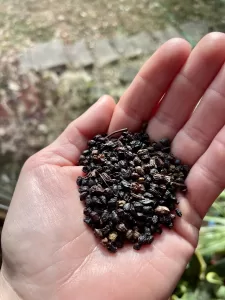
Like many berries, elderberries are a rich source of vitamins and minerals, including vitamins C and A, potassium, and iron. These nutrients contribute to overall health and wellness and support bodily functions such as skin health, vision, and red blood cell formation.
Anti-inflammatory Effects
Elderberry’s anti-inflammatory properties may help to lessen symptoms of inflammation. Inflammation is the body’s response to damage or disease. There is some research that suggest elderberry compounds can reduce inflammation and offer relief from issues such as a joint pain.
Respiratory Health
As mentioned before, elderberry, particularly the syrup, has traditionally been used as a natural remedy for respiratory issues. It may help to soother a coughs and colds because of it’s anti-viral, antibacterial, and anti-inflammatory properties. They may also have mild expectorant effects, meaning they help to thin out the mucus in your airway. This can be beneficial to those who are dealing with congestion.
Antioxidant Power
Elderberries are potent antioxidants, which play a major role in protecting cells from damage caused by oxidative stress. This oxidative stress is implicated in different chronic diseases and the aging process. Anthocyanins are one type that may also have a positive impact on heart health. They help the body reduce oxidative stress and promote healthy blood vessel functions.
Where to get and how to use Elderberries
Elderberries are something I try to always find organic. I’m sure you could find them off Amazon, but I love to get mine from Azure Standard when I’m buying whole grains to mill, sucanat, etc. If you don’t have a local drop point, they will ship to you too! As I mentioned above, you may know someone who harvests it themselves. It can be tedious work to pick the berries off, but I’d say it’s well worth it.
If making syrup doesn’t interest you, you can use the berries to make delicious jams, sauces, teas, or gummies! Gummies are a great way to help your kiddos take elderberry if they don’t like it. To make gummies you can just use the syrup recipe then add a gelatin and pour it into molds.
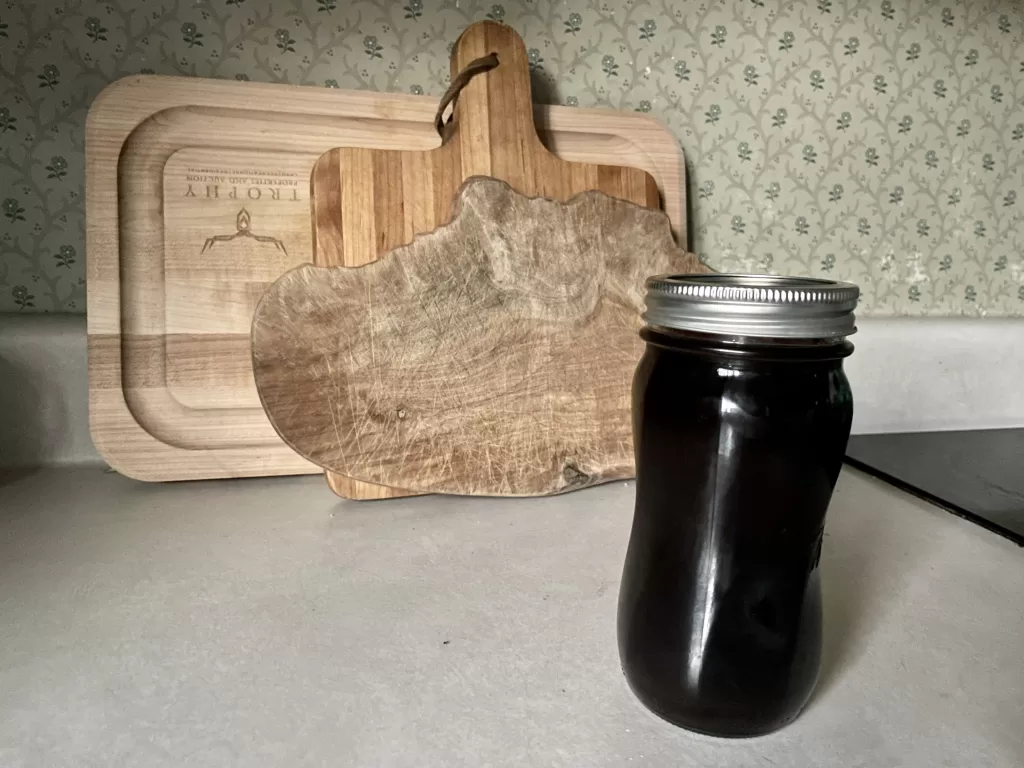
How to store elderberry syrup
After you make your elderberry syrup, store in an airtight, glass jar in the fridge for one month. Just watch your lid and the top of your syrup, if they have been in there too long, you will see mold growing!
Can I freeze homemade elderberry syrup?
Yes you can! In fact, it will help your elderberry syrup last longer than if you store it in the fridge. Just be sure to store it in an airtight container and allow room for it to expand as it freezes. It can stay frozen for about 3 months. You can keep it frozen longer, but it will probably use its potency.
Interested in Elderberry Syrup Benefits? Make Your Own!
Not much of a DIYer? Here’s the brand I used before making my own. They source their ingredients organically and use wholesome ingredients. They also offer a ton of educational resources on their website as free downloads.
Ingredients to make elderberry syrup
- Elderberries – You can use dried or fresh
- Honey – Raw and local is best. Do not give honey to children under 1. You can leave it out of this recipe or choose to sweeten with maple syrup, sucanat, or molasses instead.
- Cloves – You can use ground or whole cloves
- Cinnamon – Feel free to swap out ground cinnamon for cinnamon sticks!
- Ginger – Ground ginger can be swapped for grated ginger
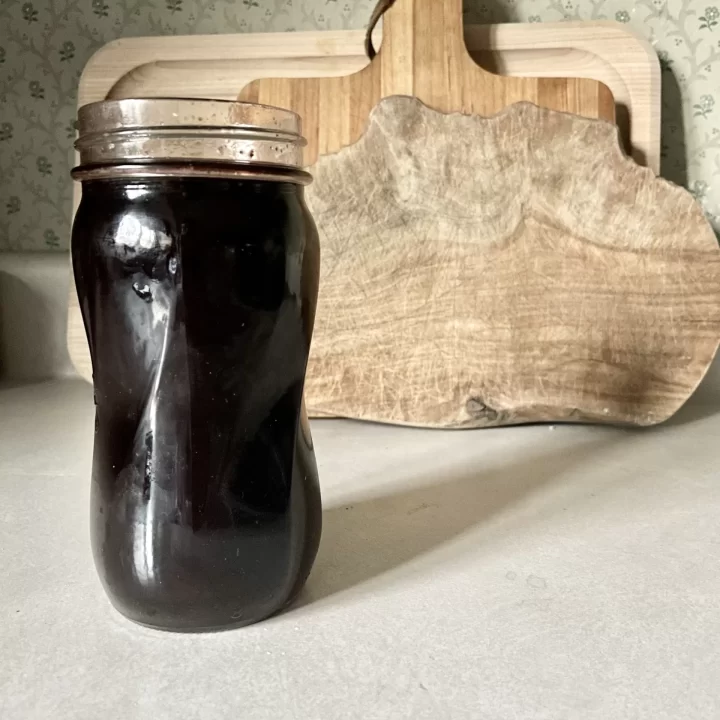
Elderberry Syrup Recipe
Ingredients
- 3/4 cup Dried Elderberries
- 3 cups filtered water
- 1 TBSP ginger powder or grated ginger
- 1 tsp cinnamon or 1 cinnamon stick
- ½-1 tsp cloves (depending on your family's preference)
- 1 cup raw honey (see alternatives in notes)
Instructions
- Put all ingredients EXCEPT the honey in a pot and bring to a boil. Reduce to a simmer for about 45 minutes until you have about 2 cups of syrup.
- Remove from heat and allow to cool.
- When cool enough, strain berries from liquid.
- Mash berries and put in a cheese or other thin cloth. Squeeze out all the juice and keep the berries and juice separate.
- Pour through a strainer into a jar or bowl for mixing.
- When no longer hot, add honey and mix well.
- Pour into your mason jar or glass container to store in the fridge.
Notes
- Children take 1 tsp/day; Adults take 1 Tbsp/day. You can increase during times of illness to 3-4x/day
- Children under one should not consume honey. Use maple syrup, sucanat, or molasses if you need to sweeten it. Start with a smaller amount then taste as your sweeten.
- Don't consume unripe or uncooked berries, instead, make them into syrups, jams, or teas! It can cause nausea, vomiting, or diarrhea.
- If you are on immunosuppressive medications or have an autoimmune disease, make sure to consult your healthcare provider first.
Don’t forget to “pin” this for later!
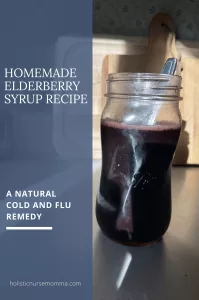
You may also like:
Have you ever used Elderberry Syrup before? Let me know!
Some links within this post may be affiliate links. I earn a small percentage from them when you use them at no extra cost to you. Thanks for supporting me!
Sources:
Zakay-Rones, Z., Thom, E., Wollan, T., & Wadstein, J. (2004). Randomized study of the efficacy and safety of oral elderberry extract in the treatment of influenza A and B virus infections. Journal of International Medical Research, 32(2), 132-140.
Krawitz, C., Mraheil, M. A., Stein, M., Imirzalioglu, C., Domann, E., Pleschka, S., & Hain, T. (2011). Inhibitory activity of a standardized elderberry liquid extract against clinically-relevant human respiratory bacterial pathogens and influenza A and B viruses. Journal of Functional Foods, 3(1), 23-30.
Młynarczyk, K., Walkowiak-Tomczak, D., Łysiak, G., & Kidoń, M. (2016). The impact of chokeberry, black elderberry and black currant juice on the morphology and the activity of selected phagocytic cells. Journal of Functional Foods, 24, 579-588.
Qin, Y., Xia, M., Ma, J., Hao, Y., Liu, J., Mou, H., Cao, L., & Ling, W. (2009). Anthocyanin supplementation improves serum LDL- and HDL-cholesterol concentrations associated with the inhibition of cholesteryl ester transfer protein in dyslipidemic subjects. The American Journal of Clinical Nutrition, 90(3), 485-492.
Youdim, K. A., & Martin, A. (2000). The anti-inflammatory potential of phenolic compounds in grape juice concentrate (G8000™) on 12-O-tetradecanoylphorbol-13-
Tiralongo, E., Wee, S. S., & Lea, R. A. (2016). Elderberry supplementation reduces cold duration and symptoms in air-travellers: A randomized, double-blind placebo-controlled clinical trial. Nutrients, 8(4), 182.
Wu, X., Gu, L., Prior, R. L., & McKay, S. (2004). Characterization of anthocyanins and proanthocyanidins in some cultivars of Ribes, Aronia, and Sambucus and their antioxidant capacity. Journal of Agricultural and Food Chemistry, 52(26), 7846-7856.

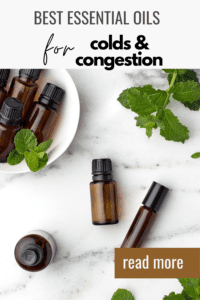
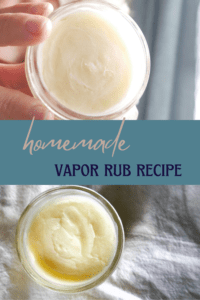
Leave a Reply